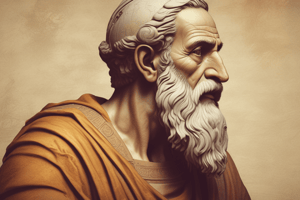Podcast
Questions and Answers
How did ancient Greek doctors differ from earlier approaches to healing?
How did ancient Greek doctors differ from earlier approaches to healing?
- They transitioned to identifying illnesses and using experience-based solutions. (correct)
- They focused on isolating patients to prevent the spread of diseases.
- They solely relied on prayers and sacrifices to appease the gods.
- They primarily used charms and incantations to ward off evil spirits.
What principle is embodied in the Hippocratic Oath?
What principle is embodied in the Hippocratic Oath?
- Prioritizing financial gain in medical practice.
- Sharing patient information with the wider community for collective knowledge.
- Maintaining patient confidentiality and respect. (correct)
- Using any available means, regardless of ethics, to cure the patient.
Which approach did Herodotus use when documenting historical events?
Which approach did Herodotus use when documenting historical events?
- He emphasized the role of supernatural forces and divine interventions.
- He provided rational explanations and explored the cultures of different societies. (correct)
- He only included information that supported the existing political powers.
- He focused solely on recording the names and dates of significant battles.
What fundamental shift did Herodotus bring to historical writing compared to his predecessors?
What fundamental shift did Herodotus bring to historical writing compared to his predecessors?
Why is Herodotus considered 'The Father of History'?
Why is Herodotus considered 'The Father of History'?
Flashcards
Hippocrates
Hippocrates
Ancient Greek physician known for the Hippocratic Oath that guides medical ethics.
Father of History
Father of History
Title given to Herodotus for establishing history as a rational discipline.
Rational analysis
Rational analysis
Method of examination focused on logic rather than myths or divine explanation.
Divine intervention
Divine intervention
Signup and view all the flashcards
Interpersonal relationships
Interpersonal relationships
Signup and view all the flashcards
Study Notes
Ancient Greek Medicine and History
- Greek healers initially believed illness stemmed from divine intervention or curses. Effective treatment involved identifying the illness and applying a logical remedy through observation.
- Hippocrates is associated with the physician's oath, which continues to influence ethical medical practice today. This oath necessitates a doctor's responsibility towards their patients and prioritizing their care.
- History, as a distinct academic discipline, originated in ancient Greece with Herodotus. He was often dubbed the "Father of History".
- Prior to Herodotus, historical accounts primarily focused on battles and heroic deeds, frequently incorporating mythological elements.
- Herodotus employed a more rational approach, focusing on verifiable information and observing various cultures throughout his travels to provide a broader narrative of human civilizations.
- History, in Herodotus's view, encompassed societies' interactions, religious beliefs, and societal progress, not simply military campaigns.
Studying That Suits You
Use AI to generate personalized quizzes and flashcards to suit your learning preferences.




